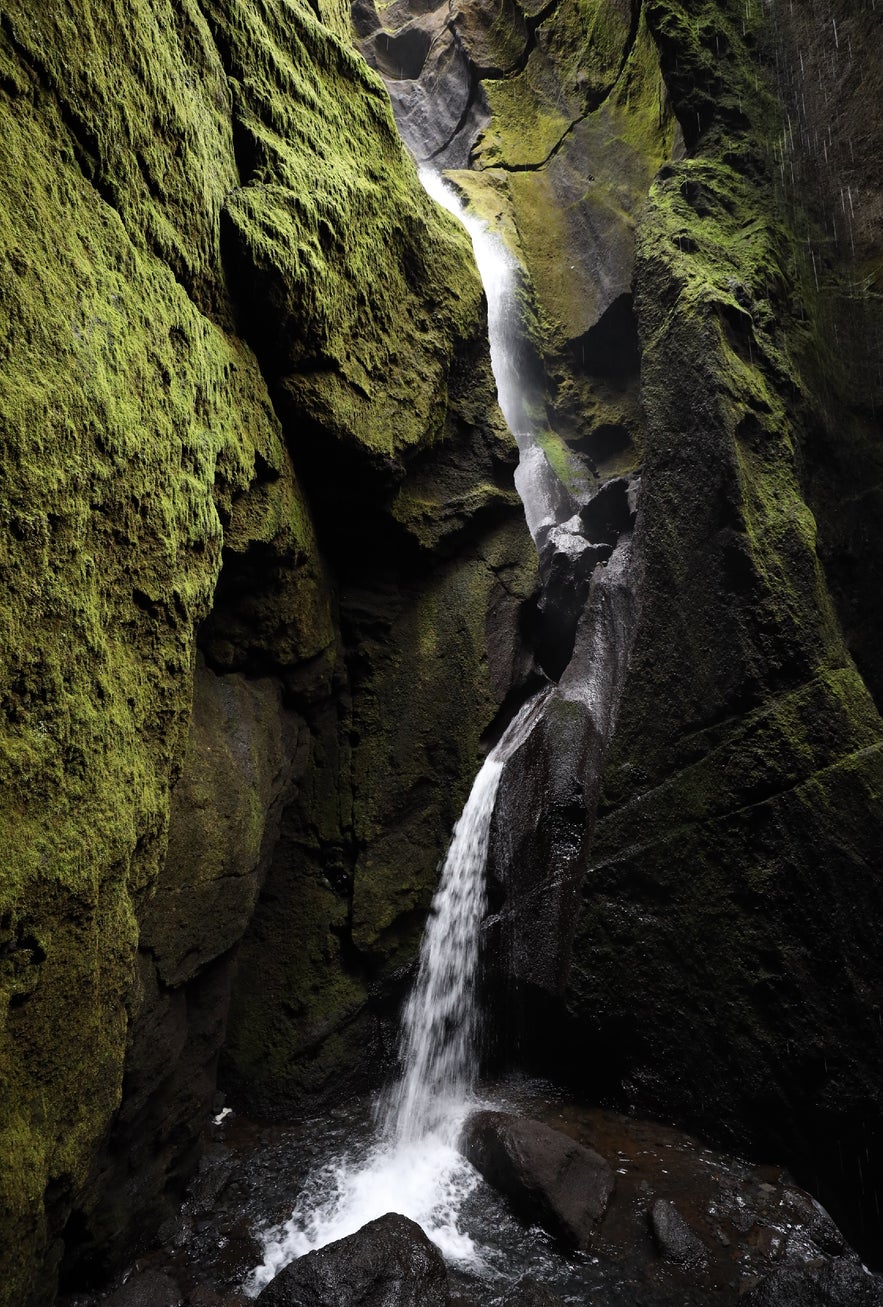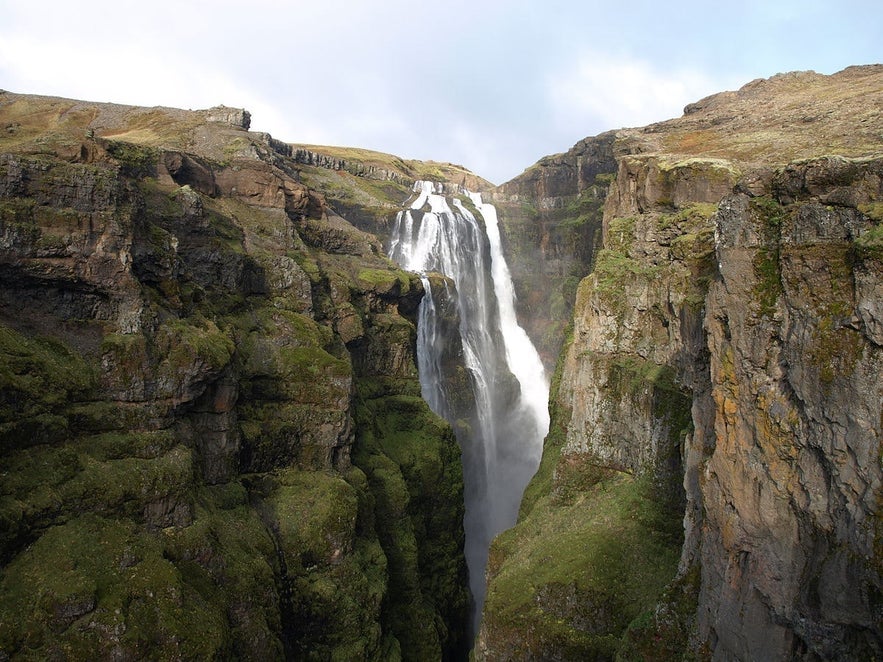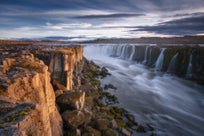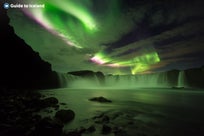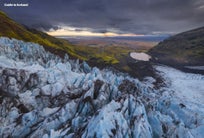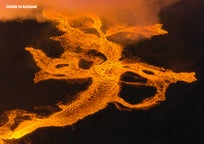
Top 11 Amazing Canyons in Iceland

- Safety Tips When Visiting Icelandic Canyons
- When Should You Visit Icelandic Canyons?
- The 11 Most Beautiful Canyons in Iceland
- 11. Sigoldugljufur Canyon
- 10. Almannagja Gorge
- 9. Stakkholtsgja Canyon
- 8. Nauthusagil Ravine
- 7. Eldgja Canyon
- 6. Thakgil Canyon
- 5. Mulagljufur Canyon
- 4. Jokulsargljufur Canyon
- 3. Asbyrgi Canyon
- 2. Fjadrargljufur Canyon
- 1. Studlagil Canyon
- Honorable Mentions
- Where to Find the Icelandic Canyons
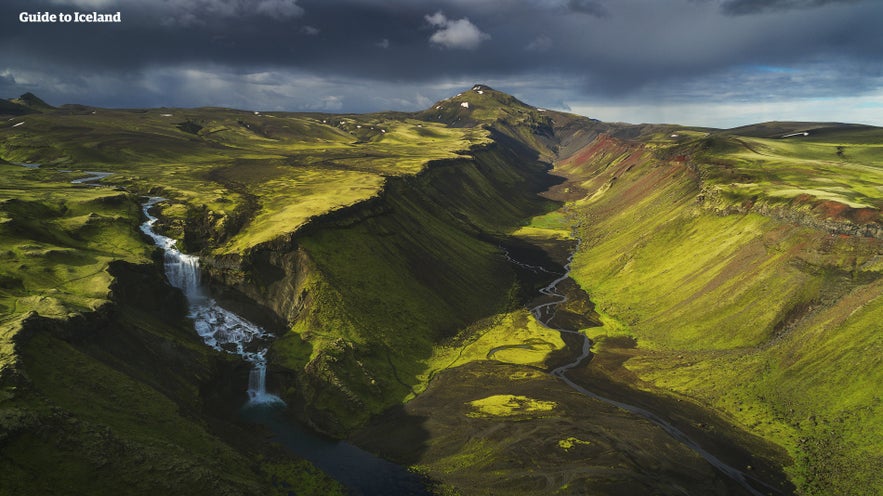
Canyons in Iceland are formed through a combination of glacial and volcanic activity that takes place over thousands of years. These powers of nature, along with the forces of water and wind, have contributed to the diverse range of the often beautiful scars on the landscape.
Whether hidden gems or massive attractions, these canyons offer visitors a glimpse into Iceland's nature with their breathtaking vistas. Some visitors may prefer to experience Iceland's canyons on exciting highlands tours, while others may prefer to do so on self-drive tours or by going off-script and renting a car. These Icelandic canyons are guaranteed to leave their mark on you, just as mother nature did on them.
Safety Tips When Visiting Icelandic Canyons
Before visiting Icelandic canyons, it's important to brush up on some general safety tips to keep in mind when exploring these locations:
Dress appropriately: Iceland's weather is unpredictable, even outside the winter season. Look up what the weather is going to be like and make sure that there are no warnings in your location.
Mind your footing: Remember to wear sturdy footwear when visiting Iceland's canyons. Be mindful of uneven surfaces, loose rocks, or slippery conditions. Trekking poles might be a good idea to maintain stability.
Be cautious near the edges: Many Icelandic canyons have steep cliffs, and while it might be tempting to see the view from the very edge, it can also be incredibly dangerous. Some of the cliffs are prone to crumbling, and disaster can strike with great speed.
Respect nature: Finally, preserve the beautiful natural environment by taking your trash with you and maintaining a safe distance from the delicate flora and fauna.
Travel Plan: If traveling to a remote area, make sure to submit a travel plan beforehand. This will minimize the danger if things go awry during your travels.
When Should You Visit Icelandic Canyons?
So when is the best time to visit these magnificent canyons? The question of whether it's better to visit Iceland during winter or summer is an old one with pros and cons on each side. Here are some things to keep in mind:
- Many of Iceland's most beautiful canyons are located in remote areas that can be hard or impossible to reach during winter. If the canyon you want to visit is located in the Highlands or another remote area, make sure to visit it in the summer.
- The difference in scenery between winter and summer can be very stark and completely transform the appearance of the canyons. The same canyon will look totally different when covered in vibrant greenery and wildflowers compared to snow-covered cliffs and frozen waterfalls.
The 11 Most Beautiful Canyons in Iceland
Iceland is known for its natural wonders, and with hundreds of canyons to choose from, people are bound to have their favorites. We've taken it upon ourselves to narrow the list a little bit by choosing some of our favorites.
The list is by no means exhaustive, but if you feel as if your favorite canyon is missing, don't forget to stick around for the honorable mentions at the end!
11. Sigoldugljufur Canyon
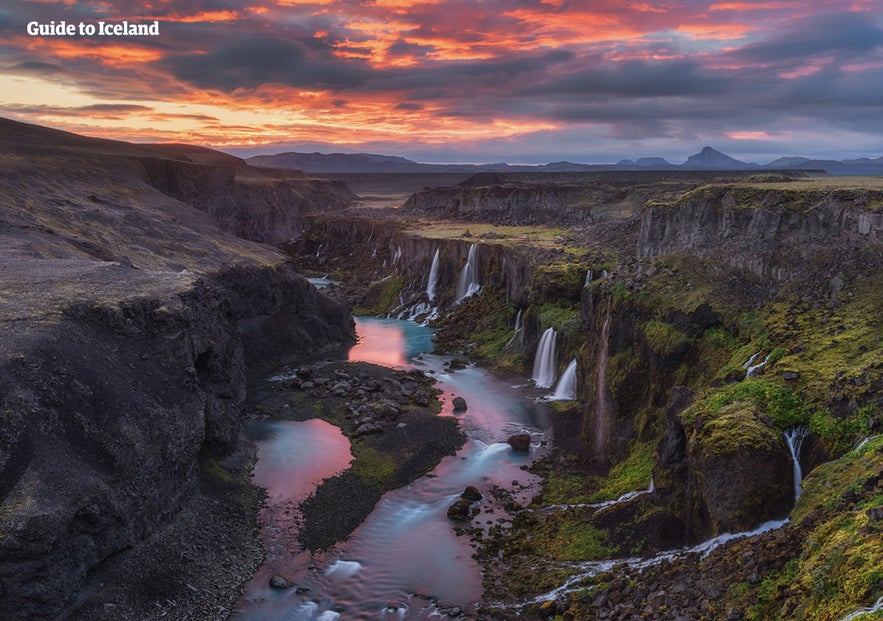
Nicknamed the "Valley of Tears," Sigoldugljufur is a beautiful canyon known for its numerous waterfalls. Located in the Icelandic Highlands, the vividly blue water and greenery of Sigoldugljufur offers a welcome addition of color to its surroundings.
Located relatively far from other attractions, Sigoldugljufur is still relatively unknown compared to some of the other entries on this list. This allows visitors to fully take in the fantastical landscape without too much commotion.
While many of its counterparts boast a long history, Sigoldugljufur only recently became a canyon. It used to be a part of a glacial river before the installment of a hydroelectrical plant nearby and could therefore be called a man-made canyon!
How to Get to Sigoldugljufur Canyon
As seen on this map, Sigoldugljufur Canyon is located in the central highlands, so renting a four-wheel-drive vehicle is essential to reach it. Only visitable in the summer, a good way to get to Sigoldugljufur is to start from Hella and take Road 26 off the Ring Road. Follow the road for roughly 50 miles (82 kilometers) until you reach F208 Mountain Road, which will bring you to the canyon.
10. Almannagja Gorge
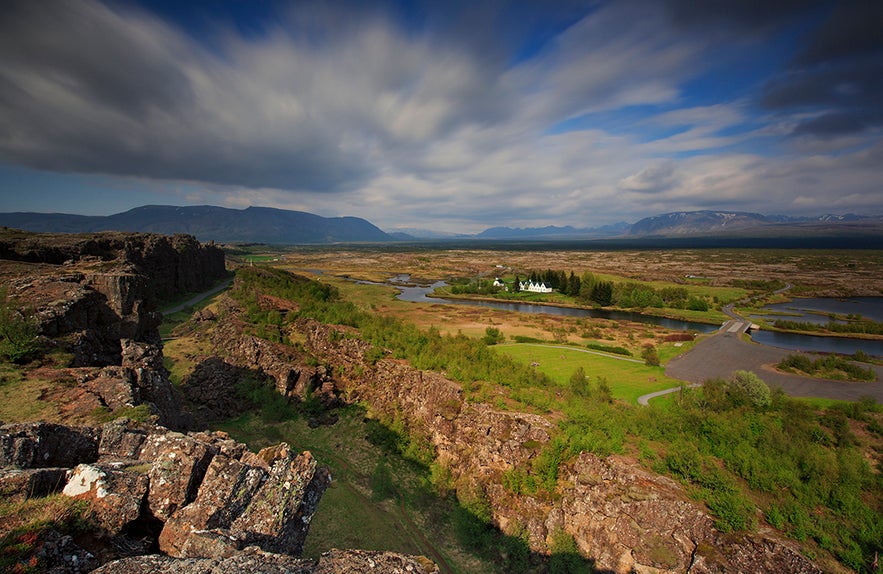
Almannagja is a historically and geologically significant gorge located at Thingvellir National Park. As a part of the Golden Circle, Almannagja is Iceland's most visited canyon.
Stretching just a little under a mile long, the canyon is located on the Mid-Atlantic Ridge, where the North American and Eurasian tectonic plates are drifting apart. Seeing this rift in person is a rare opportunity and certainly one of Almannagja's main features.
Almannagja is not only geologically important but historically as well. It served as a meeting place of the Althing, the world's oldest ongoing parliament. Standing within the canyon, you can almost hear the echoes of the law speakers of old shouting.
How to Get to Almannagja Gorge
Almannagja is located less than an hour from Reykjavik. To get there, take Route 36 straight to Thingvellir National Park.
Visiting Almannagja is relatively easy as there is no shortage of great Golden Circle Tours tailored to different needs. Spice things up with an exciting tour of The Golden Circle and snowmobiling, or combine the Golden Circle and the Secret Lagoon for a more relaxing alternative.
9. Stakkholtsgja Canyon
Located within the Thorsmork Nature Reserve in South Iceland, the mysterious canyon of Stakkholtsgja offers a secretive experience that will spark your sense of adventure.
Running a little over a mile long and up to 330 feet (100 meters) deep, this beautiful canyon has several streams running through it, adding to the already relaxing ambiance. Traversing between the towering cliffs on either side feels nothing short of a fairy tale.
The crowning jewel of this wondrous canyon is its hidden waterfall. It is hard to describe the feeling of discovering the waterfall for yourself, but it will leave visitors feeling like they just found hidden treasure after a long and rewarding quest.
How to get to Stakkholtsgja Canyon
Stakkholtsgja is located in the Thorsmork Nature Reserve, which is only accessible in the summer. Getting there requires a four-wheel drive. Take the F249 Mountain Road off the Ring Road until you reach a river crossing, and make sure that your vehicle and conditions allow you to cross. After crossing the river, continue into the road to Thorsmork Valley until you reach the designated parking area.
8. Nauthusagil Ravine
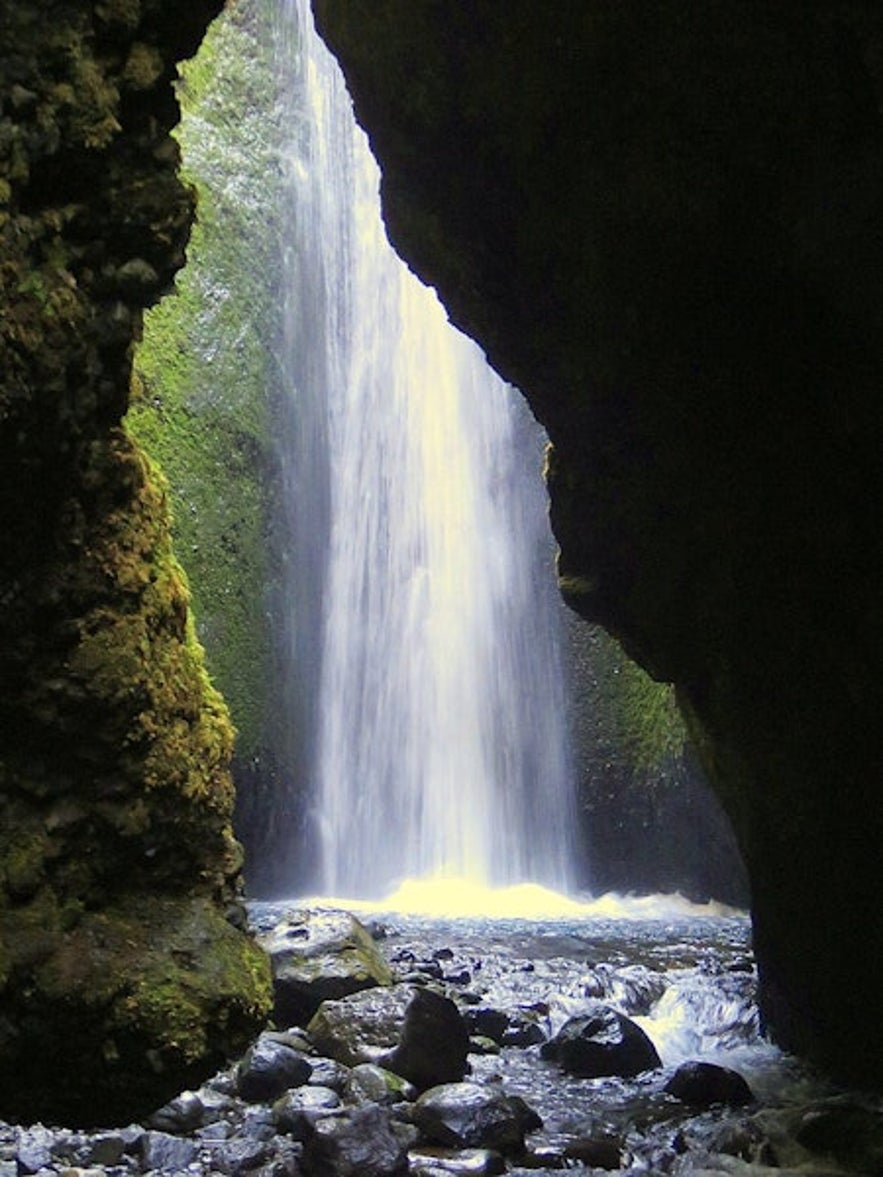
Tucked beneath the glacial volcano Eyjafjallajokull, Nauthusagil is a narrow ravine and a true hidden gem waiting to be explored.
As you enter Nauthusagil, greenery and tall cliffs enclose the canyon, creating an atmosphere of adventure. One of Nauthusagil's most notable characteristics is the wild rowan tree which grows on its ridges.
A small stream flows along the canyon floor, and visitors might have to show some dexterity crossing it to reach the treasure at the end of Nauthusagil: a gorgeous waterfall that showers down in a natural funnel of the cliffside. The misty air by the waterfall is often lit up by the sunlight peeking through the top.
How to get to Nauthusagil Ravine
Nauthusagil is located by the F249 Mountain Road, the same road that leads to Thorsmork Nature Reserve. If you have a rental car, make sure not to go in the winter unless you have a four-wheel drive.
7. Eldgja Canyon
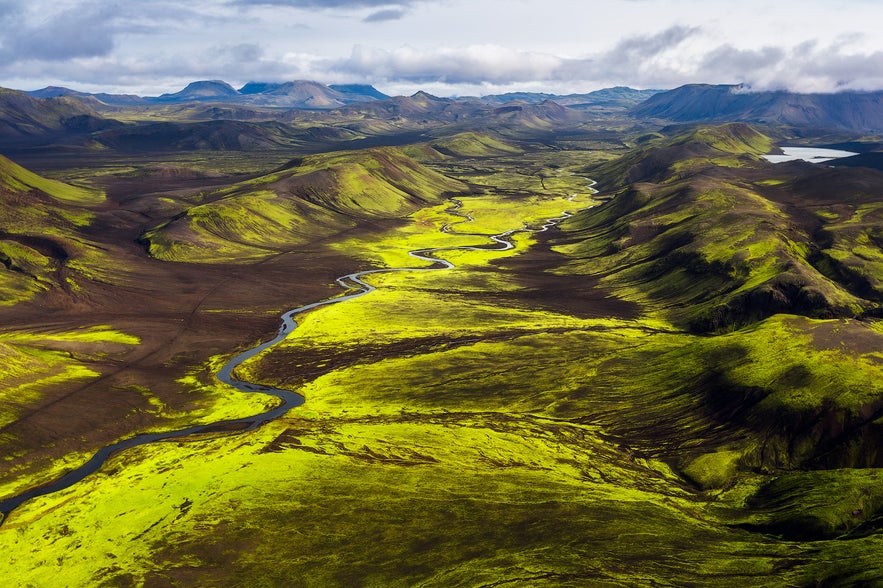
Eldgja, translating to "Fire Canyon" in Icelandic, is a breathtaking volcanic canyon in the Highlands. Stretching over 25 miles (40 kilometers) in length and reaching depths of 880 feet (250 meters), it is one of the largest volcanic canyons in the world.
Hiking through Eldgja offers a unique opportunity to witness the raw power of Iceland's nature up close. Lying parallel to the craters of Lakagigar, the site has been home to massive eruptions throughout the centuries.
Visiting Eldgja is a great way to connect with Iceland's volcanic past and marvel at the sheer magnitude of nature's power. It is also home to the stunning Ofaerufoss, a multi-tiered waterfall running through the volcanic rocks.
How to get to Eldgja Canyon
Eldgja is located in the highlands and is therefore only accessible during the summer. Getting there requires a four-wheel drive, and the ride might get bumpy, but will ultimately be well worth it. Take Route 1 until turning on Road 208 until it changes to the F208 Mountain Road.
Drive down the F208 until you will reach a sign for a road called Gjatindur that will take you toward the Eldgja site. If you want to leave the driving to someone else, spare yourself the hassle in this epic 8-hour super jeep tour.
6. Thakgil Canyon
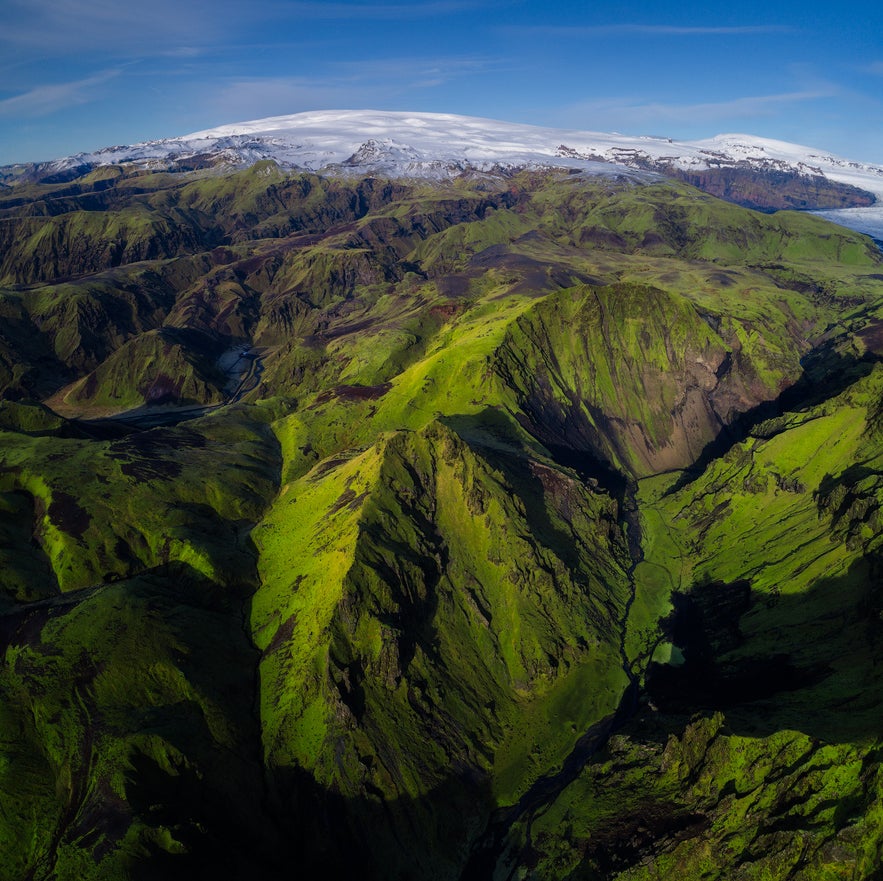
Thakgil is a picturesque gorge located in the South of Iceland, nestled next to the glacier of Myrdalsjokull. Filled with jagged rocks that take all kinds of forms and shapes, it rewards visitors with an active imagination.
Located about 12 miles (20 kilometers) northeast of the town of Vik, many consider Thakgil a hidden gem. Thakgil features a well-maintained campground that offers a welcoming setting and basic amenities for visitors and serves as a great base of operations for the multiple hiking trails that can be found in the area.
With tall mountains serving as a natural shelter from the elements, visitors can fully engross themselves in the natural splendor of Thakgil. With velvety moss, mysterious caves and gorgeous waterfalls at the bottom, and panoramic views over the glacier at higher altitudes, Thakgil is a hiker's paradise.
How to Get to Thakgil Canyon
Thakgil Canyon is located roughly 40 minutes' driving distance Vik. From Route 1, take Road 214, which will bring you to the campsite. While not a mountain road, the road is graveled, so take care.
5. Mulagljufur Canyon
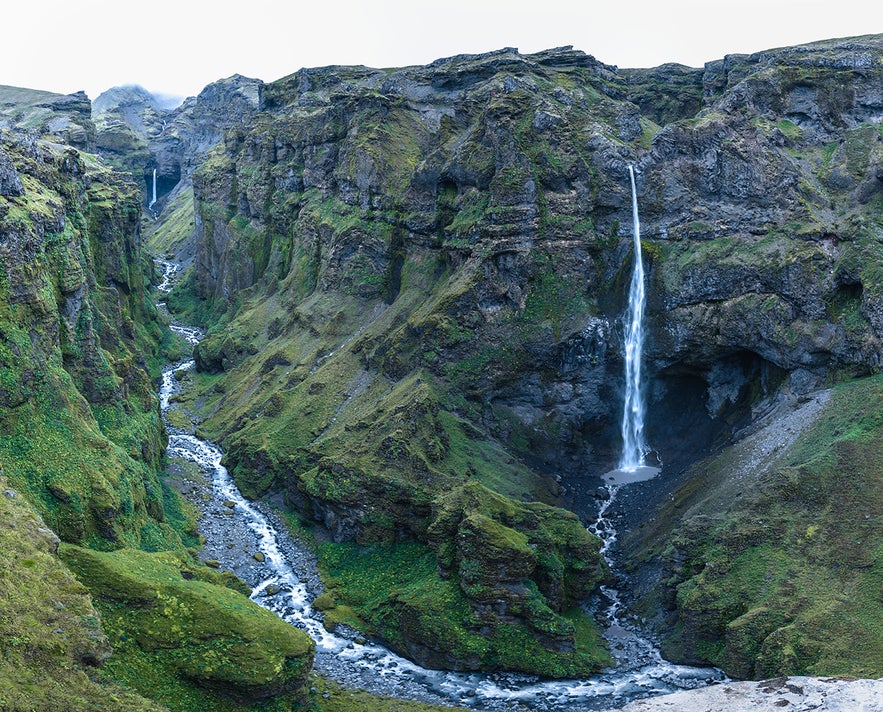 Mulagljufur is a somewhat hidden canyon located at the edge of southeast Iceland. With no signs to guide visitors to the site, Mulagljufur is easily missed. Those who have experienced it, however, will vouch for its beauty.
Mulagljufur is a somewhat hidden canyon located at the edge of southeast Iceland. With no signs to guide visitors to the site, Mulagljufur is easily missed. Those who have experienced it, however, will vouch for its beauty.
Popular with hikers, Mulagljufur has narrow paths that lead visitors through its rugged cliffs covered in green moss and wildflowers. The towering cliffs and the delicate flora and fauna make for a serene experience in this secluded haven.
The canyon features not only one but two cherries on top with the mysterious waterfalls of Hangandifoss and Mulafoss. Despite these spectacular waterfalls being among the tallest in Iceland, they are often forgotten due to their location off the beaten path.
How to Get to Mulagljufur Canyon
Mulagljufur Canyon is located 231 miles (372 kilometers) from Reykjavik. Visitors from Iceland's capital will have to drive approximately 4 hours and 30 minutes to reach the mouth of the canyon via the Ring Road.
4. Jokulsargljufur Canyon
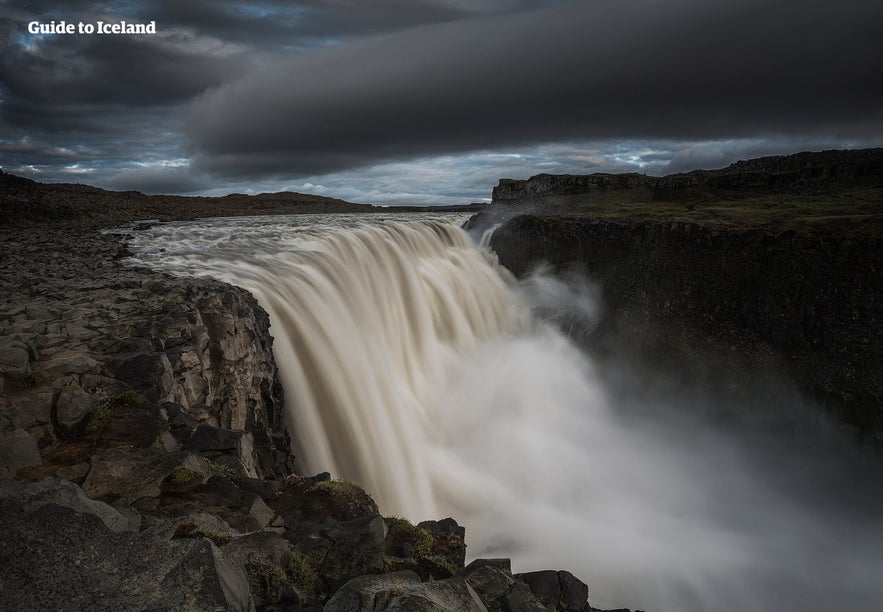
The imposing canyon of Jokulsargljufur is one of Iceland's most imposing natural wonders, located in the North East. Carved by a glacial river and stretching over 15 miles, Jokulsargljufur is an excellent showcase of nature's raw power.
Jokulsargljufur is home to several impressive waterfalls, most notably Dettifoss, the second-most powerful waterfall in all of Europe (pictured above). With a water flow of 1.970 cubic feet (183 cubic meters), it remains one of Iceland's most iconic landmarks.
The canyon boasts numerous other attractions, such as Hljodaklettar, a unique rock formation characterized by its basalt columns and unusual shapes. Translating to "Echo Rocks," Hljodaklettar's name derives from the strange echoes created by the unusual rock formations.
How to Get to Jokulsargljufur Canyon
Jokulsargljufur Canyon is located in the north of Iceland and is easiest to visit by those staying in east Iceland, in a settlement such as Egilsstadir, or North Iceland, in Akureyri, Husavik, or Lake Myvatn.
If traveling the Ring Road, Jokulsargljufur can be visited by turning on either Road 862 or 864, but it can also be experienced as a part of a tour such as this guided tour of North Iceland with Dettifoss, Lake Myvatn & Godafoss.
3. Asbyrgi Canyon
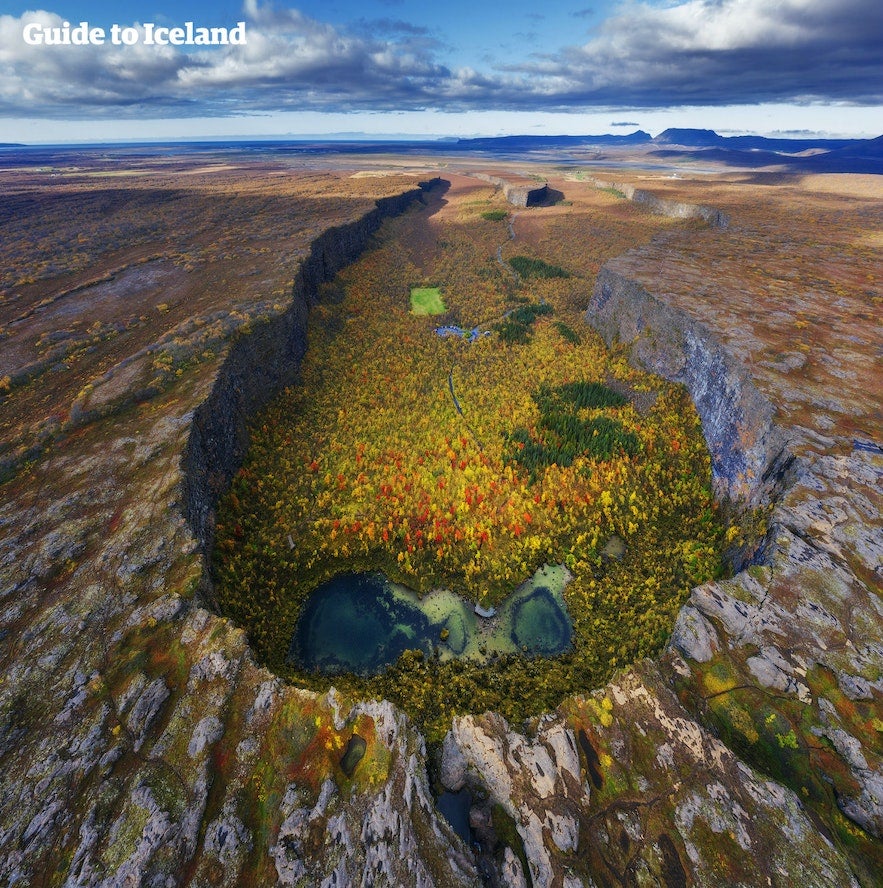
The mythical canyon of Asbyrgi is a large, horseshoe-shaped depression located in Northeast Iceland. Legend has it that Asbyrgi was formed by the hoofprint of Sleipnir, the eight-legged horse of the Norse god Odin, and the awe-inspiring scenery might support that myth.
Asbyrgi stretches over two miles and is surrounded by towering cliffs over 300 feet tall. Nestled within the canyon are colorful trees, which make it a paradise for nature lovers. A large rock formation called Eyjan, translating to "The Island," divides the canyon for almost half its length and gives it its distinctive shape.
For those more impressed with geology than myth, it is estimated that Asbyrgi Canyon began to form roughly eight to ten million years ago, just after the last Ice Age, following catastrophic glacial flooding. The flooding likely occurred due to a volcanic eruption beneath the glacier Vatnajokull.
There are many hiking trails within Asbyrgi, such as to the pond Botnstjorn, which lies at the heart of the canyon. The peaceful stillness of its water, enhanced by the sounds of birds and the gentle rustling of leaves, makes for an unforgettable experience.
How to Get to Asbyrgi Canyon
Asbyrgi Canyon is located east of the town of Husavik, just off Road 85, which connects to the Ring Road. It's a main stop on Diamond Circle tours, such as this unforgettable 9-hour Diamond Circle tour from Akureyri.
2. Fjadrargljufur Canyon
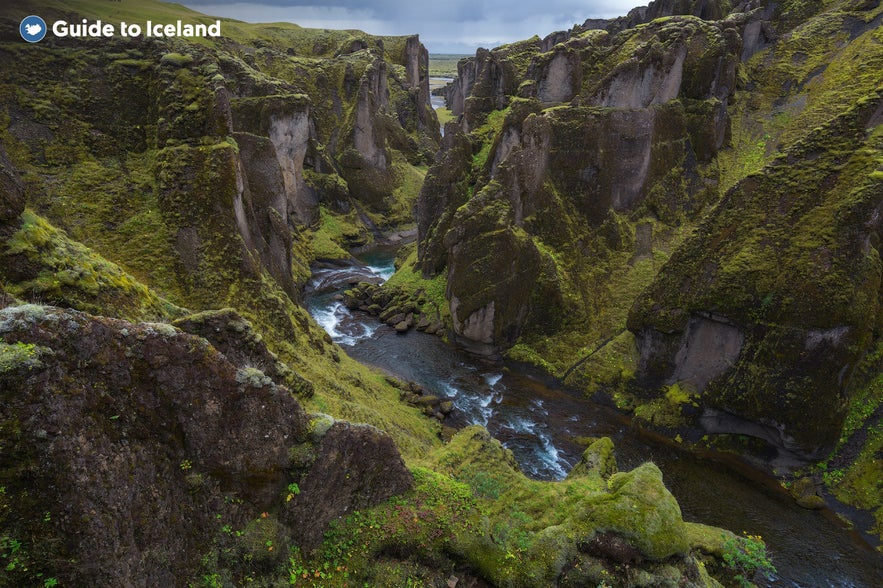
Fjadrargljufur is a mesmerizing canyon in the south of Iceland that has only recently started garnering the attention it deserves. With stunning panoramic views littered at every corner of its marked trail, it is no wonder that Fjadrargljufur has become one of Iceland's most famous attractions.
Easily recognizable by its unique shape, Fjadrargljufur features steep cliffs, numerous waterfalls, rugged rock formations, and meandering bends. At just over 1.2 miles long, it is almost as if nature decided to cram as much beauty into this wondrous area as possible.
One of the culprits behind the Fjadrargljufur's surging popularity was popstar Justin Bieber who shot a music video for his song "I'll Show You" at the canyon, exposing its beauty to a global audience.
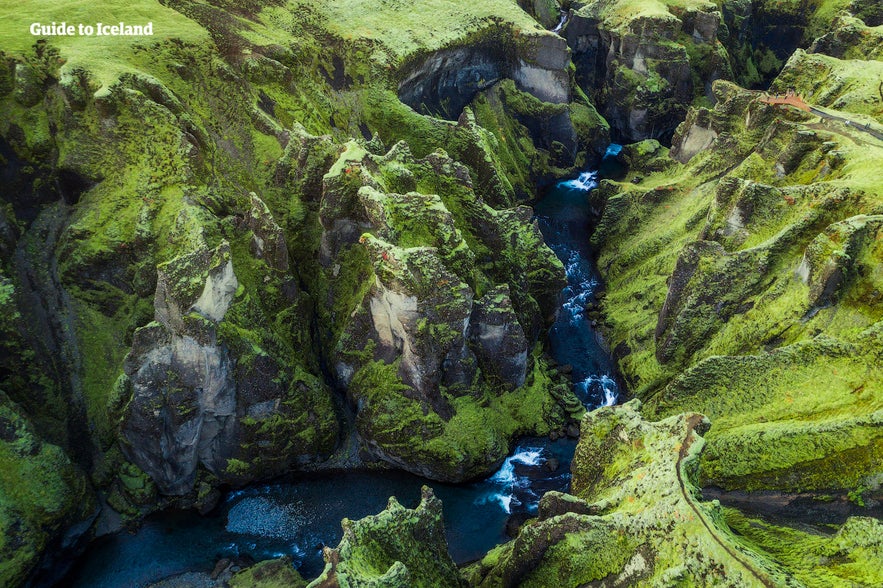
The influx of hikers led to concerns about the environmental impact and preservation of the delicate ecosystem within the canyon. As a result, Fjadrargljufur was temporarily closed to the public to allow for vegetation recovery and restoration of the area. Visitors are urged to tread lightly and not venture off the trail onto the cliffs.
How to Get to Fjadrargljufur Canyon
Fjadrargljufur Canyon is located a short distance from the town of Kirkjubaejarklaustur. From the Ring Road, take Road 206, which will take you to a designated parking area. Before or after exploring the canyon, we'd recommend visiting another nearby wonder on a Glacier Lagoon boat ride among icebergs.
1. Studlagil Canyon
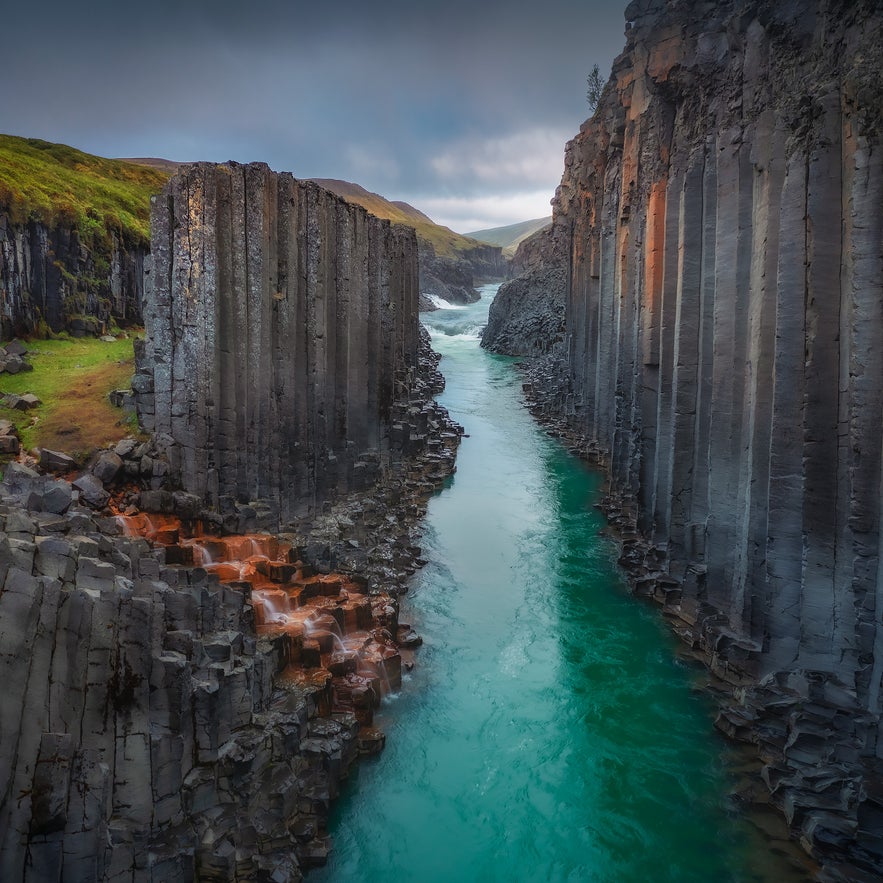
Located in the East of Iceland, Studlagil was created by the force of a glacial river forcing its way down from the highlands. Because of its relatively remote and hard-to-reach location, Studlagil remained relatively unknown for a long time.
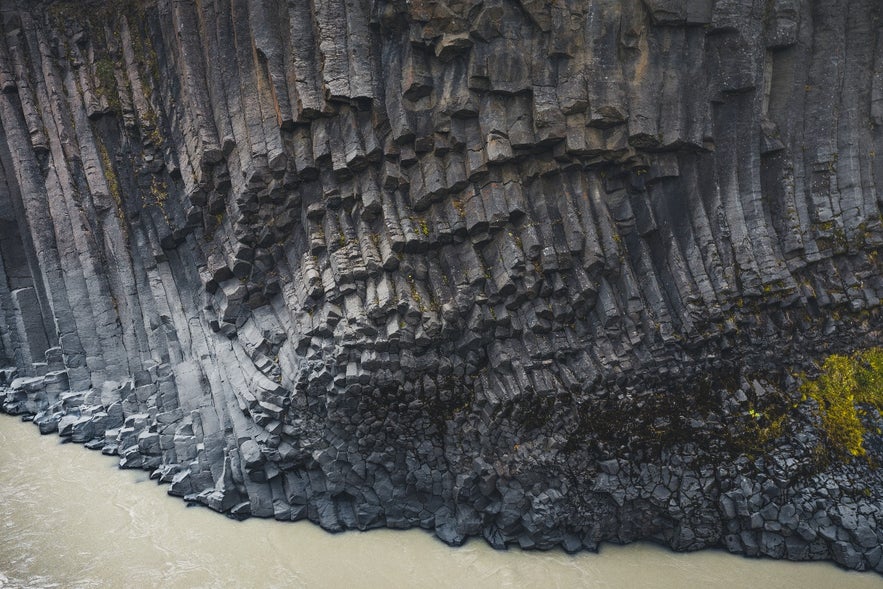
The towering basalt columns that line the canyon walls are similar to those found at Reynisfjara black sand beach but much higher in number. These columns were formed as lava cooled and contracted, creating fractures that resulted in today's distinctive patterns. Located close to Studlagil is the waterfall Studlafoss, also surrounded by basalt columns.
The magical color of the river is a result of glacial meltwater from nearby glaciers. As the water runs through the canyon, it carries fine sediment and minerals, lending a captivating quality to the river. A great way to experience the colors is in this thrilling 7-hour nature tour.
Often seeming like a gothic cathedral built with intent rather than a result of natural forces, with its vibrant river contrasting with the rugged cliffs, Studlagil is our pick for Iceland's most beautiful canyon.
How to Get to Studlagil Canyon
Studlagil Canyon is located in the east of Iceland, far from Reykjavik. The best way to get there is to drive the Ring Road before turning off on Road 923. After a short drive, you will begin to see the opening to the lower part of Jokuldalur Valley. We recommend parking your car in the parking lot and taking a walk the rest of the way.
Honorable Mentions
While our Top 11 Canyons in Iceland are certainly stunning, it would be a shame not to share some of the beautiful canyons that were close to making the list.
Photo from Wikimedia, Creative Commons, by Jabbi. No edits made.
Glymur is Iceland's second-highest waterfall (pictured above), accompanied by a beautiful canyon. Easily accessible by foot and located close to Reykjavik, it is a popular hiking location for good reason. Raudfeldsgja Gorge is a hidden treasure on the Snaefellsnes Peninsula. With moss-covered walls, narrow crevices, and a small waterfall, it is a recipe for an adventure.
Finally, Kolugljufur is a gorge in North Iceland filled with multiple beautiful waterfalls. While it is relatively unknown, it is hard to forget.
Where to Find the Icelandic Canyons
Now that you know the names of the most amazing canyons in Iceland, you'll want to know how to get there. Below you can find a map with the location of each canyon on the list, along with the honorable mentions.
What do you think of our list? Did we miss your favorite canyon? Please let us know in the comments below!
Inne interesujące artykuły

W co się ubrać na Islandii: Najlepszy przewodnik na każdą porę roku
Islandia słynie z nieustannie zmieniającej się pogody, z łagodnymi zimami i często chłodnym oraz wietrznym latem. Pakowanie się na wyjazd do kraju, w którym bogowie pogody mają skłonność do wahań nast...Czytaj więcej
Kompletny przewodnik po wybuchu wulkanu Sundhnukagigar w 2024 r.
Dowiedz się wszystkiego, co musisz wiedzieć o erupcji wulkanu Sundhnukagigar na Islandii w 2024 roku. Co to oznaczało dla mieszkańców Grindaviku? Jak silna była erupcja w porównaniu do innych niedawny...Czytaj więcej
Półwysep Snaefellsnes | Zaplanuj urlop na Islandii
Jakie są główne atrakcje na półwyspie Snaefellsnes? Dlaczego nazywany jest „Islandią w miniaturze”? Przeczytaj o tym pięknym regionie leżącym w zachodniej Islandii i dowiedz się, gdzie są najlepsze...Czytaj więcej

Pobierz największą platformę turystyczną na Islandii na telefon i zarządzaj wszystkimi elementami swojej podróży w jednym miejscu
Zeskanuj ten kod QR za pomocą aparatu w telefonie i naciśnij wyświetlony link, aby uzyskać dostęp do największej platformy turystycznej na Islandii. Wprowadź swój numer telefonu lub adres e-mail, aby otrzymać wiadomość SMS lub e-mail z linkiem do pobrania.
